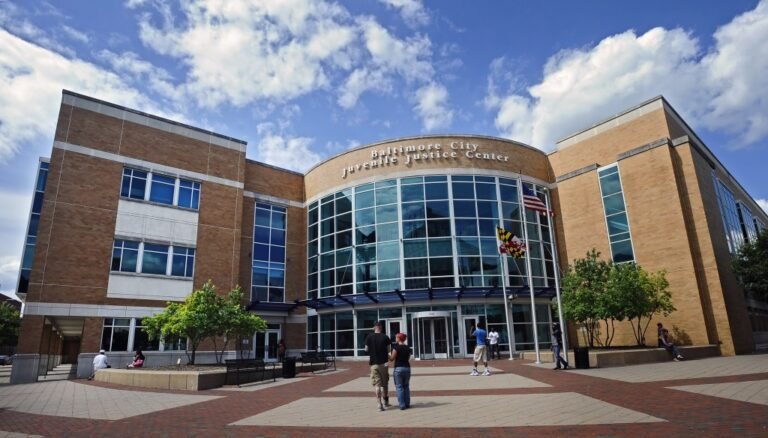With youth justice at the center of this session, a bill proposed by Republicans would ban students who have been convicted or sentenced for rape or other sex offenses from attending school. There is.
State Sen. Johnny Salling and state Rep. Nino Mangione met last month with two mothers in Harford and Baltimore counties who say their young children were sexually abused by a teenage boy attending a Baltimore City high school. The bill was then submitted in opposition.
On Wednesday morning, a mother joined Salling in a hearing before the Senate Judiciary Proceedings Committee. Salling said she was first introduced to her family after Fox 45 reported that the victim’s abuser attended a high school in Baltimore.
“These are serious cases of incest, rape and sexual assault, and there should be some accountability,” Salling said in an interview. “And we shouldn’t allow students to go back to school because we don’t understand how that person thinks.”
Under Senate Bill 1145, a child would be prohibited from directly attending a state-funded public or non-public school if he or she is convicted or sentenced in adult court for rape or a sex crime that is considered a felony. Each school system must provide alternative education, such as virtual programs, to those students. The bill does not indicate how long these students would be prohibited from in-person learning.
Maryland law already prohibits students on the Adult Sex Offender Registry, which is open only to those 18 and older, from being on school grounds or attending public schools. School districts must educate these students in alternative locations until they are removed from the sex offender registry.
Mangione and Salling’s bill aims to close the so-called “loophole” for children who commit sex crimes but are not registered as adults. Maryland has a juvenile offender registry, but it is only accessible by law enforcement officers for law enforcement purposes.
“That’s what we’re trying to address here,” Mangione said. “How many other people are walking the hallways of these schools?”
Registration is often required by prosecutors or negotiated in deals, said Levi Bradford, an education lawyer with the nonprofit law firm Public Justice Center, who is part of a coalition opposing the bill. He said some children could avoid registering if prosecutors decide they don’t need to, but the bill would tie up children who don’t need to register.
When a student is arrested and sentenced, the local superintendent, principal, and security officer are notified. But it’s up to the judge in a child’s case to decide whether the child should be returned to the community.
Students have a constitutional right to an education, and the 2022 law limits expulsion if the student poses an “imminent threat of serious harm to other students or staff.” In-person school expulsions can be appealed.
Last year, the state Department of Education found that Baltimore County Public Schools violated the law when it banned in-person instruction for a student suspected of committing a sex crime.
Democratic and Republican lawmakers have one month left to debate differences between the two chambers’ massive juvenile justice bills. The House bill would expand the charges for children ages 10 to 12 to include animal mutilation, firearms offenses and third-degree sex crimes.
Sherrie Christian, a Baltimore City schools spokeswoman, said the school system legally cannot discuss students’ personal issues or block judicial proceedings, and that convicted sex offenders attend Baltimore high schools. He said he could not comment on the report by the lawmaker or FOX45.
“More generally, Maryland law requires city schools to provide an education to all students lawfully enrolled in our schools, including those found responsible for juvenile delinquency. We can all share that this is mandatory,” Christian said in a statement.
The city school system can only expel a student “if the student follows certain legal procedures and there is concrete evidence of an imminent threat of serious harm,” Christian continued. Ta. “In making this decision, we will consider all available documentation and work closely with the appropriate authorities to ensure that the appropriate standards are met.”
The state Public Defender’s Office, as part of the School Discipline Reform Coalition, strongly opposes the bill, saying it violates federal law. The Individuals with Disabilities Education Act states that students with disabilities, even offenders, must be educated in the “least restrictive environment” or school districts will lose federal funding. It is said to be dangerous.
Maryland Public Defender Natasha Dartigue said, “Banning in-person education based solely on a conviction or sentence is counterproductive, deprives individuals of important problem-solving resources, and deprives children and their communities. It is likely to cause even greater harm.” In a statement.
Dartigue said the coronavirus pandemic has made it clear that virtual school is an inferior form of education, especially for young people with learning disabilities or other educational deficiencies. Denying education based solely on past convictions also perpetuates cycles of poverty, unemployment and criminality, she said.
Annette Anderson, the mother of a student in the Baltimore City Schools, wants to know if a juvenile sex offender attends her child’s school. Anderson, associate director of the Johns Hopkins Center for Safe and Healthy Schools, a research center, said there is no need to know the identities of these students.
“I think blinding gender registries in schools and districts could help at least make parents aware,” she says.
Anderson said he is encouraged by the way juvenile justice laws are being enacted this Congress in a thoughtful manner rather than an “opportunistic reaction.” But more needs to be done, she said, especially when it comes to balancing the protection of children with the community’s right to know about juvenile offenders.

